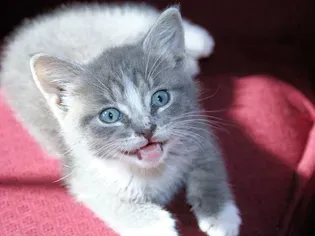Sneezing in Cats and Kittens
Updated on 05/27/24

Sneezing in Cats and Kittens: A Comprehensive Guide
Introduction
Sneezing is a common reflex in cats and kittens, but it can also be a sign of underlying health issues. Understanding the causes of sneezing and knowing when to seek veterinary attention is crucial for ensuring your feline companion's well-being. This comprehensive guide will delve into the various reasons why cats and kittens sneeze, provide examples, and offer practical advice on how to manage and treat this condition.
Causes of Sneezing in Cats and Kittens
1. Viral Infections
* Feline Herpesvirus (FHV-1): A highly contagious virus that causes upper respiratory infections, including sneezing, watery eyes, and nasal discharge.
* Feline Calicivirus (FCV): Another contagious virus that can lead to sneezing, ulcers on the tongue and lips, and respiratory distress.
2. Bacterial Infections
* Bordetella bronchiseptica: A bacterium that causes respiratory infections, characterized by a hacking cough and sneezing.
* Chlamydophila felis: A bacterium that infects the conjunctiva and respiratory tract, resulting in sneezing, discharge, and conjunctivitis.
3. Allergic Rhinitis
* Atopy: An allergic reaction to environmental allergens, such as pollen, dust, or certain foods.
* Food Allergies: Some cats may develop an allergic reaction to specific ingredients in their diet, leading to sneezing, itching, and digestive problems.
4. Foreign Bodies
* Nasal Polyps: Small, fleshy growths that form in the nasal passages, causing irritation and sneezing.
* Grass Seeds: Sharp, barbed grass seeds can become lodged in the nose or throat, resulting in sneezing and discomfort.
5. Respiratory Irritants
* Smoke: Smoke from cigarettes, candles, or fireplaces can irritate the respiratory tract and trigger sneezing.
* Chemicals: Exposure to cleaning products, paints, and other household chemicals can cause inflammation and sneezing.
Examples
* Viral Infections: A kitten with a persistent sneeze, watery eyes, and nasal discharge is likely suffering from a viral infection like FHV-1.
* Bacterial Infections: A cat with a hacking cough, sneezing, and nasal discharge may have an underlying bacterial infection like Bordetella bronchiseptica.
* Allergic Rhinitis: A cat that sneezes frequently, especially during certain seasons or when exposed to certain allergens, may have allergic rhinitis caused by atopy.
* Foreign Bodies: A cat that suddenly starts sneezing and pawing at its nose may have inhaled a foreign body, such as a grass seed.
* Respiratory Irritants: A cat exposed to smoke or strong chemicals may develop irritation and sneezing as a result.
When to Seek Veterinary Attention
While occasional sneezing is normal in cats and kittens, persistent or severe sneezing warrants veterinary attention. Seek immediate medical care if your cat or kitten:
* Sneezes frequently or excessively
* Has difficulty breathing
* Exhibits nasal discharge that is discolored or foul-smelling
* Shows signs of lethargy or loss of appetite
* Has a fever or other signs of illness
Treatment and Management
Treatment for sneezing in cats and kittens depends on the underlying cause.
* Viral Infections: Antiviral medications may be prescribed to manage symptoms and prevent secondary infections.
* Bacterial Infections: Antibiotics are typically used to treat bacterial respiratory infections.
* Allergic Rhinitis: Antihistamines or steroids can help reduce inflammation and alleviate sneezing.
* Foreign Bodies: If a foreign body is lodged in the nasal passages, your veterinarian may need to remove it surgically.
* Respiratory Irritants: Avoiding exposure to irritants is the best way to prevent or manage sneezing caused by smoke or chemicals.
Prevention
* Vaccinations: Vaccinating your cat or kitten against FHV-1 and FCV can help prevent viral respiratory infections.
* Regular Check-ups: Regular veterinary check-ups can help detect and treat underlying health issues that may cause sneezing.
* Hygiene: Maintaining a clean litter box and environment reduces the risk of exposure to infectious agents.
* Avoidance of Allergens: Identifying and avoiding allergens that trigger sneezing in your cat or kitten is crucial.
* Proper Diet: Feeding your cat a high-quality diet that does not contain ingredients that trigger allergic reactions is essential.
Conclusion
Sneezing in cats and kittens can be caused by a variety of factors, ranging from mild irritants to underlying health conditions. Understanding the potential causes and knowing when to seek veterinary attention is vital for ensuring the well-being of your furry friend. By implementing preventive measures, such as vaccinations, regular check-ups, and allergen avoidance, you can help minimize the risk of sneezing and keep your cat or kitten healthy and happy. Remember, if you have any concerns about your cat's or kitten's sneezing, do not hesitate to consult your veterinarian for expert advice and appropriate treatment.
Explore More Pets

Cat Behavior Problems
How to Stop Aggression in Kittens

Long-Haired Cat Breeds
Siberian Cat: Breed Profile, Characteristics, & Care

Cat Behavior Problems
How to Stop Kittens From Scratching and Biting

Long-Haired Cat Breeds
Turkish Angora: Cat Breed Profile, Characteristics & Care

Basic Training
How to Socialize Your Kitten

Short-Haired Cat Breeds
Cute Pictures & Facts About Calico Cats & Kittens

Litter Box Training
Training Your Kitten to Use the Litter Box

Long-Haired Cat Breeds
10 Fun Facts About White Cats
